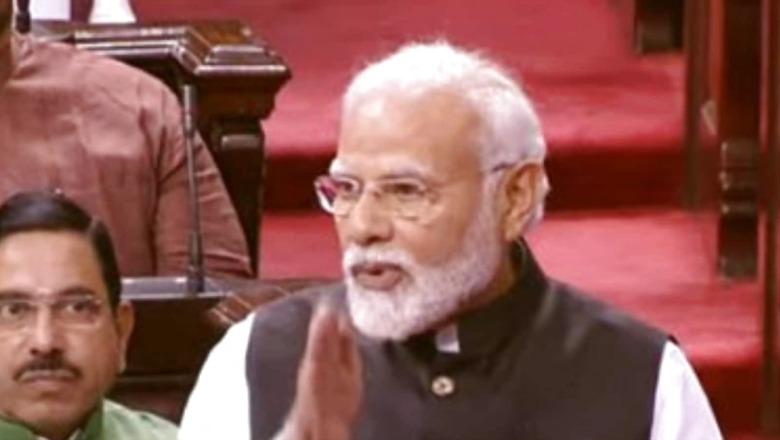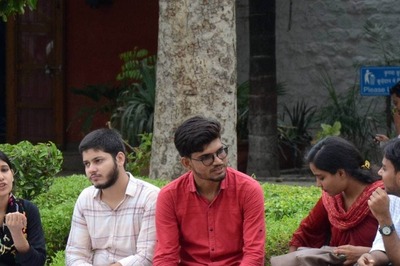
views
One of the most bold and historic moves by the Narendra Modi government this year has been the Centre’s decision to reduce the disturbed areas under the Armed Forces (Special Powers) Act, 1958 in the states of Nagaland, Assam and Manipur, where it had been in force for decades. In fact, removal of AFSPA has been a long pending demand of the people of the Northeast, particularly Manipur; for them, this move is like a dream come true. If one analyses the major developments in the entire Northeast region, they can clearly see that the action of the central government is aimed at addressing the demands of the people and political parties of the region. Several political leaders of the region, including MPs and chief ministers, lauded Prime Minister Narendra Modi and Home Minister Amit Shah-led BJP government for this historic move.
The Armed Forces (Special Powers) Act was enforced in 1958 in Naga-dominated districts of Senapati, Tamenglong and Ukhrul districts where National Naga Council (NNC) was active. It was imposed in the Kuki and Zomi-dominated areas of Churachandpur in 1960s and later extended to the rest of Manipur in 1979. This Act provides certain special powers to Armed Forces personnel within Arunachal Pradesh, Assam, Manipur, Meghalaya, Mizoram, Nagaland and Tripura. The powers were also extended to forces deployed in Jammu and Kashmir. Interestingly, the British administration first introduced the law to suppress the Quit India Movement in 1942. In Manipur, the disturbed area status had been partially removed from seven Assembly segments in Imphal in 2004.
ALSO READ | Northeast Security Expert Explains AFSPA, Its Phased Withdrawal, Next 5 Steps for Govt
Irom Chanu Sharmila (the iron lady) went on fasting for 16 long years as a protest against this Act and demanded for its total removal. Besides Sharmila, many civil society organisations and individuals also demanded for removal of this draconian act for several years. In the latest move, the central government has announced to remove AFSPA from 23 districts in Assam, from seven districts in Nagaland, and 15 police stations in six districts of Manipur, namely Jiribam PS, Thoubal PS, Bishnupur PS, Kakching PS, four police stations of Imphal East and seven police stations of Imphal West. The Act, however, remains in force in the hill districts of Manipur.
It may not be wrong to state that reducing AFSPA’s ambit shows the government’s commitment to and success in bringing a peaceful atmosphere in the Northeast, particularly Manipur. Peace and development are two parallel tracks. Development cannot prevail without peace and vice-versa. The region is now witnessing infrastructure development and improvement in law and order, and better connectivity. With the removal of AFSPA from 15 police stations in Manipur, many multinational companies will see Manipur as a perfect destination for investment.
Manipuri activist Irom Chanu Sharmila has also welcomed the Union government’s decision. In an interview to the Hindustan Times, she said, “I am happy to see mainland politicians in Parliament are willing to do something different. The decision to repeal an outdated and colonial law seems a real sign of democracy. It’s a new beginning and a result of decades-long fight. The first step has been taken, and I want AFSPA to be abolished permanently from North-east”.
ALSO READ | Lifting AFSPA: Government Must Remember 2004 Lesson, States Have to Step up to the Task
In 2004, then central government had set up a five-member committee under former Supreme Court Justice Jeevan Reddy, which submitted its report in 2005 recommending repeal of AFSPA, calling the Act ‘highly undesirable’. The second Administrative Reforms Commission headed by Veerappa Moily endorsed these recommendations. Former home secretary G.K. Pillai too supported the repeal of AFSPA. Former Home Minister P. Chidambaram had said that the Act, if not repealed, should at least be amended. However, the recommendations made by these committees were not transformed into action by the past governments.
With the firm pledge and commitment towards bringing peace and prosperity to all the eight states in the region, Prime Minister Modi has succeeded in unlocking the vast potential of the Northeast region with sheer hard work, dedication, focused approach and sustained effort. The peace achieved in the region has led to various sectors securing unprecedented growth. With peace returning to the Northeast, people from all walks have reclaimed an opportunity to live their lives with respect.
The writer is a veteran journalist based in Manipur. The views expressed in this article are those of the author and do not represent the stand of this publication.
Read all the Latest Opinion News and Breaking News here




















Comments
0 comment